Kobayashi Masaki and
The Fall of Japanese Film
“Samurai Rebellion,” “Kwaidan,” “Dunhuang”
It was director Kobayashi Masaki who selected Nakadai Tatsuya to play the leading role in the six-part The Human Condition, elevating him to immediate stardom. Having worked with numerous master directors throughout his career, Nakadai describes especially his partnership with Kobayashi as the “best match” for him. But while Kobayashi made full use of his mastery in the 1960s, there was a sudden decline in the number of works he produced in the 70s. He then made a mere two films in the 80s, and finally zero in the 90s. You could say it was as if this one director personified the shift from Japanese film’s golden age to its decline.
In this final chapter, Nakadai talks about changes in the world of Japanese cinema throughout director Kobayashi Masaki’s life as it was heading towards its fall.
Unprecedented Masterpiece:
“Kwaidan”
After Harakiri, Kobayashi Masaki’s next undertaking was 1964’s Kwaidan. Based on a book by Lafcadio Hearn (Koizumi Yakumo), the film marked a departure from his earlier depictions of realism, instead showcasing a world of illusion and spectral beauty, all filmed on set. It is an omnibus film featuring several ghost stories linked together. Nakadai stars in one of said stories: The Woman of the Snow.
I appeared in the story The Woman of the Snow. We shot that out in the suburbs of Kyoto at a car manufacturer’s warehouse. They didn’t want anyone seeing their prototype models so they’d built a test course inside the warehouse itself. It was an enormous space, and Kobayashi reserved it for our exclusive use. It was all shot on set—we couldn’t have fit the entire set inside any of the existing film studios at the time.
It really was a great film from an artistic standpoint. However, unlike with most movie productions where you would shoot any given scene from a variety of angles, that wasn’t the case with Kwaidan. Just as with a theater stage, there was only one side to the set. So, whenever they wanted to turn the camera around, they first had to demolish the set and rebuild it on the other side. This took an enormous amount of time and money.
As a result, Ninjin Club—the producers of The Human Condition—went bankrupt. I, too, was paying my flights to Kyoto as well as things like my hotel bills from my own pocket. Most of the actors who worked on the movie did so without pay, as did the staff.
Ultimately it did become a good film, and so we were going to take it to the Cannes Film Festival. Kishi Keiko, who also starred in The Woman of the Snow, was married to a French director so she was living over there. She was running all around France, making the preliminary arrangements.
The Cannes Executive Office, however, notified us that the running time of the film was too long. It was decided that one part of the omnibus film had to be cut, and wouldn’t you know it, out of all the parts in the film, Kobayashi chose specifically to cut The Woman of the Snow. Kishi was furious. Filled with high expectations, she had been working so hard for the movie over in France.
But thinking back on it now, it really was art for art’s sake. It’s what made him “Kobayashi Masaki.” It was simply his artistic intuition telling him that The Woman of the Snow was the one that needed to go. He must’ve had thoughts along the lines of, “But that’s the part with Nakadai in it, and Kishi has been working so hard for the film, too…” I’m sure he did. But even so, he did not hesitate to cut it. That’s what made Kobayashi Masaki the director he was.
As a result of making that movie, Ninjin Club went bankrupt, and Kobayashi himself had to sell off his large Aoyama house. This great director lived out the rest of his life in a two-room rental apartment.
I myself contributed around four million yen to the production of that film. Then, when Kobayashi passed away, he’d left behind a will that said, “Compensate Nakadai with the sum he gave with the money from my life insurance.” I received word of this right after his wife passed. Naturally, I did not accept the money.
“Samurai Rebellion” & Mifune Productions
Nakadai’s next appearance in a Kobayashi production was in Samurai Rebellion (1967). Like Harakiri, it is a period drama with a screenplay written by Hashimoto Shinobu, depicting the absurdities of samurai society. Nakadai stars as the close friend of the protagonist, played by Mifune Toshiro. Following in the footsteps of the pair’s Kurosawa films, the ending features another violent duel scene between the two.
This was a film that Kobayashi very much wanted me to do. Being close friends with Mifune’s character and yet ultimately having to cross swords with him, it was an extremely challenging role. There was a connection between our characters on a personal level, and yet we were forced to fight each other for the sake of the fiefdom.
With the film even receiving the Best Film Award on Kinema Junpo, I suppose it’s fair to say that Kobayashi was in his prime around this time.
Samurai Rebellion was produced by Mifune Productions, of which Mifune Toshiro himself was the president. In the mid-sixties the film industry was suffering from declining audience numbers, and so in an attempt to break themselves free from this bind, one exclusive actor after the other—from each movie company—established their own production firm. There was Ishihara Productions by Ishihara Yujiro of Nikkatsu, Katsu Productions by Katsu Shintaro of Daiei, Nakamura Productions by Nakamura Kinnosuke of Toei, and finally Mifune Productions by Mifune Toshiro of Toho.
To this day, I still have a lot of respect for Mifune as a great senior actor of mine. But apparently, when Mifune established Mifune Productions, Kurosawa—who had been making all those films together with him—advised him against becoming a company president. But, well… This was a time when stars were stars. They all wanted to create their own production firms, plan their own films, and go against the major companies. That aspect of it was interesting, I feel.
Of other works by Mifune Productions, I also briefly appeared in the Mifune-directed Legacy of the 500,000. I believe he was mostly assisted by Kurosawa’s staff on that one—I don’t think Mifune personally did much actual directing. I’ve also heard that it was actually Kurosawa who edited the movie. So, I don’t have a particularly strong image of Mifune as a director.
It’s a tough job, being a director. There have been other actors who have tried their hand at directing. But to make a good film, you also need good cameramen, good lighting people, good sound recording people, good chief assistant directors, and not to mention a good script… I suppose if you had all that, you could make it work. I have personally been approached many times about directing opportunities, but I’ve never taken anyone up on the offer.
The Film That Never Was:
“Dunhuang”
Kobayashi Masaki only made two films in the 80s: the 1983 documentary Tokyo Trial, and 1985’s The Empty Table.
Tokyo Trial is a work that he spent years compiling, borrowing film material from America and other foreign countries. Watching it now, it’s quite spectacular. It offers a rather objective depiction the Tokyo Trial—a trial where the victors judged the defeated. As Kobayashi himself had taken part in the war, he must have had strong feelings about it all.
His final movie was The Empty Table, based on an Enchi Fumiko novel about a family whose son is a member of the United Red Army. This was a rather interesting film, but there were production troubles along with a lack of people going to see it.
Kobayashi was a very untalkative person, never having anything clever to say at press events and the like. Thus, he was not popular with the media or the critics. For example, when Harakiri had its premiere in Japan, Misora Hibari had just come out with a kayou pop film around the same time, and so it was listed together with Harakiri in the newspapers. The headlines for her film were all, “BEAUTIFUL, VOCALLY TALENTED MISORA HIBARI!” Meanwhile, for our film the headlines were… “NEEDLESSLY CRUEL PICTURE.” That was how they’d always treat him. I was thinking, “Hey, now just wait a minute!”
People in our profession, we’re really just better off when we’re praised by critics. In contrast to the critical acclaim which Kobayashi enjoyed internationally, he didn’t receive nearly the level of domestic acknowledgement that he deserved.
Kobayashi didn’t make any more films after The Empty Table. In 1996, filled with lingering disappointment, he drew his last breath.
Until the very end, Kobayashi wanted to make a film about Inoue Yasushi’s novel Dunhuang (or Tun-Huang). He even had the script written, and I was of course going to be in it, too. It was already after The Human Condition that he first told me, “I want to make Dunhuang into a movie. You’re going to be the young protagonist.” But as time went on and the film just wasn’t materializing, I too got older and my role was changed to that of the mercenary general.
Inoue and Kobayashi even went to Dunhuang together for location scouting, so I was sure the movie was going to be made. But then the copyright of the novel was transferred over to publisher Tokuma Shoten, and… I don’t know the exact details of what happened there. Inoue was telling them he wanted to have Kobayashi do the adaptation, but for reasons unbeknownst to me, that didn’t happen. Instead, Tokuma Shoten’s president Tokuma Yasuyoshi chose to have Dunhuang made into a large-scale entertainment film.
Kobayashi had studied ancient Buddhist art in university, so he wanted to offer an archaeological perspective, presenting China’s historic ruins as the “heritage of mankind” and make the novel into a true dramatic depiction of the people who died trying to preserve those ruins. If Dunhuang was to be made by a different movie company, a different director, a different cast… Had it been a great film, then sure, that would have been fine. But most likely it was not going to be the sort of film that we had envisioned.
Kobayashi felt very down about this. I told him, “Come on, Kobayashi. Who cares? Let them make their movie and we’ll make ours.” But he had spent many years in preparation for the film, even having finished the script, and so to have the work taken from him by someone in that manner… It made him extremely disheartened. He ceased to make films. Of course, being a person of his caliber, he still had offers coming to him. But he refused to work on anything that was not to his liking, and thus The Empty Table became his last work.
So you might then ask: how did Kobayashi make a living after that? Well, through mahjong. He was very, very good at it. His play style was to just keep at it persistently until he won. Me, I was terrible at mahjong so I would often pay to deal into someone else’s hand. This would make Kobayashi angry. I’d say, “Hey, I’m the one paying for it! What’s the problem?!” And he’d go, “I was just about to win!”
Kobayashi is who first discovered me. I consider it all thanks to him that I am still active to this day. It really is regrettable how the director himself ended up living out his last years. But then again, I’m inclined to think that maybe that is just how all true artists die. It was the same with Kurosawa. He had no money after doing Ran, so he had no choice but to keep making those smaller works until his death. But when I saw him for the last time, he told me how he wanted to make one more “big one.” For Kurosawa, the film he had always wanted to make was Tolstoy’s War and Peace.
Kobayashi wanted to make Dunhuang, no matter what. Kurosawa wanted to make War and Peace, no matter what. But they both passed away without doing so. Perhaps it has always been the lot of artists throughout the ages for them to die before getting to create that one last thing they really wanted to create.
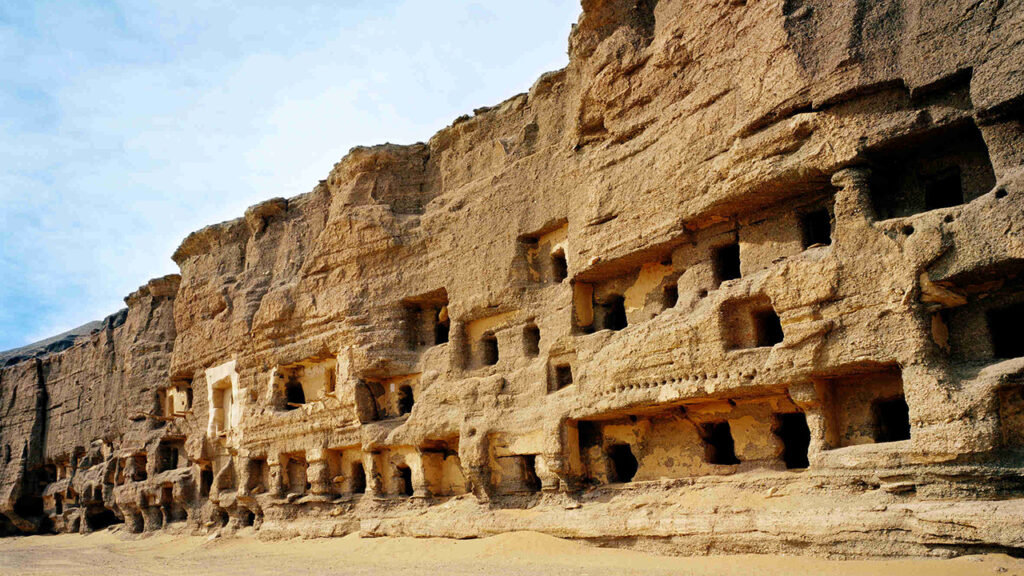
Caves of the Thousand Buddhas
Dunhuang, China
*
People often talk about “compatibility” between a husband and a wife, and similarly, there’s definitely compatibility between an actor and a director. I am very much indebted to Kurosawa as well, but at the end of the day it was Mifune who made for the best duo with him. When it was Kurosawa and Mifune, it was… “anything goes.” That’s just how well they worked together. When you have good chemistry with someone, you can tell what the other person is thinking just by looking in their eyes. You’re dancing to the same beat.
In that sense, the best match for me was Kobayashi.
Ever since I was a teenager, I never found much enjoyment in Hollywood films with happy endings. I always had a preference for European films, especially films from the UK, France, and Sweden. I always liked stories that dealt with themes like the emptiness of life, and characters ending up beyond redemption. Kobayashi, as a student of ancient Buddhist art, would put a lot of philosophical thought into his films. His endings were more in denial of humans rather than in affirmation of them.
As with both The Human Condition and Harakiri, all of his films were about defiance against authority, and about dying in the process. Our shared “aesthetics of death,” I suppose—that sort of thing is what made us such a great match.
The Great Directors
Nakadai Tatsuya has been working with a star-studded group of filmmakers ever since his youth. Those experiences, he says, are a big reason behind why he is still able to continue working in the forefront of the film industry even now at nearly the age 85.
If there’s one thing I’ve learned through working with all those amazing directors ever since I was in my twenties, it’s perseverance. I have been very fortunate to appear in so many movies, all while also doing theater. It’s like I didn’t have a single day off in my twenties. But as a result, I developed the ability to tell what any given director wants from me. That, and the ability to tell what each particular work is trying to convey.
For instance, Kurosawa Akira would use me one way, and Kobayashi Masaki another. Ichikawa Kon used me in one way in Conflagration, and in a different way in Odd Obsession. Kinoshita Keisuke used me in yet another way in Immortal Love. They all tried to make use of me in differing ways.
Every director would always tell me, “Don’t do for me what other directors have told you to do.” So I would have to use my body and my acting technique to try and figure out what it was exactly that the director required of me. And that’s no easy feat. I believe I became able to do it exactly because I got to work with so many different directors.
So that is why I have quite a repertoire—I’ve been doing this for 60 years now, after all. However, there are times when that repertoire actually gets in the way, depending on the work. In times like that, I try my best to revert to a pure, first-year student. But the problem is… I can’t be a pure, first-year student anymore. The good thing about being a rookie is possessing that degree of freshness you have because you haven’t been to many sets yet.
At the end of the day, I do believe that actors are expendable. And so no matter how much money they might be offering you, my instincts tell me that you should avoid appearing in uninteresting projects to the extent that you can. It only serves to instill unnecessary stereotypes about you in the audience. It’s best to instead let them think, “Hmm, it’s been a while since I last saw that guy in anything. I hope to see him again soon.” The audience is a cruel mistress—they can be so fast to get bored of an actor.
I believe there to be two types of actors.
There’s the type who takes everything about himself and becomes his role—his expression, his state of mind, his movements. This type, I feel, is the true professional. But there is another type of actor: the character actor who chooses a single image and continues to build upon it. This kind of actor is also very admirable to me—if anything, I’m actually envious of actors like that. It shows that they have enough charisma to be able to pull that off, and they have an audience who wants to see them even if they’re always playing the same role, thus making the production viable.
On the other hand, actors like that require projects which are specifically made with them in mind. For me, it’s never like that. As a freelance actor, no one ever makes a project specifically for me. With people like Ishihara Yujiro or Takakura Ken—exclusive actors to a film company—they’ll say, “Let’s produce a movie for Yujiro.” “Let’s make a film for Takakura.” There has never been anyone out there saying, “Let’s produce a film for Nakadai.”
Instead, in my case, it has always been just the director thinking, “You know what, I think Nakadai could probably play this role.” The company executives never liked this, though, because I wasn’t an exclusive actor for them. As a company, they’d want for the director to use their exclusive actors. I very much have to express my gratitude to all of the staff, including the directors, for their support in getting me where I am today.
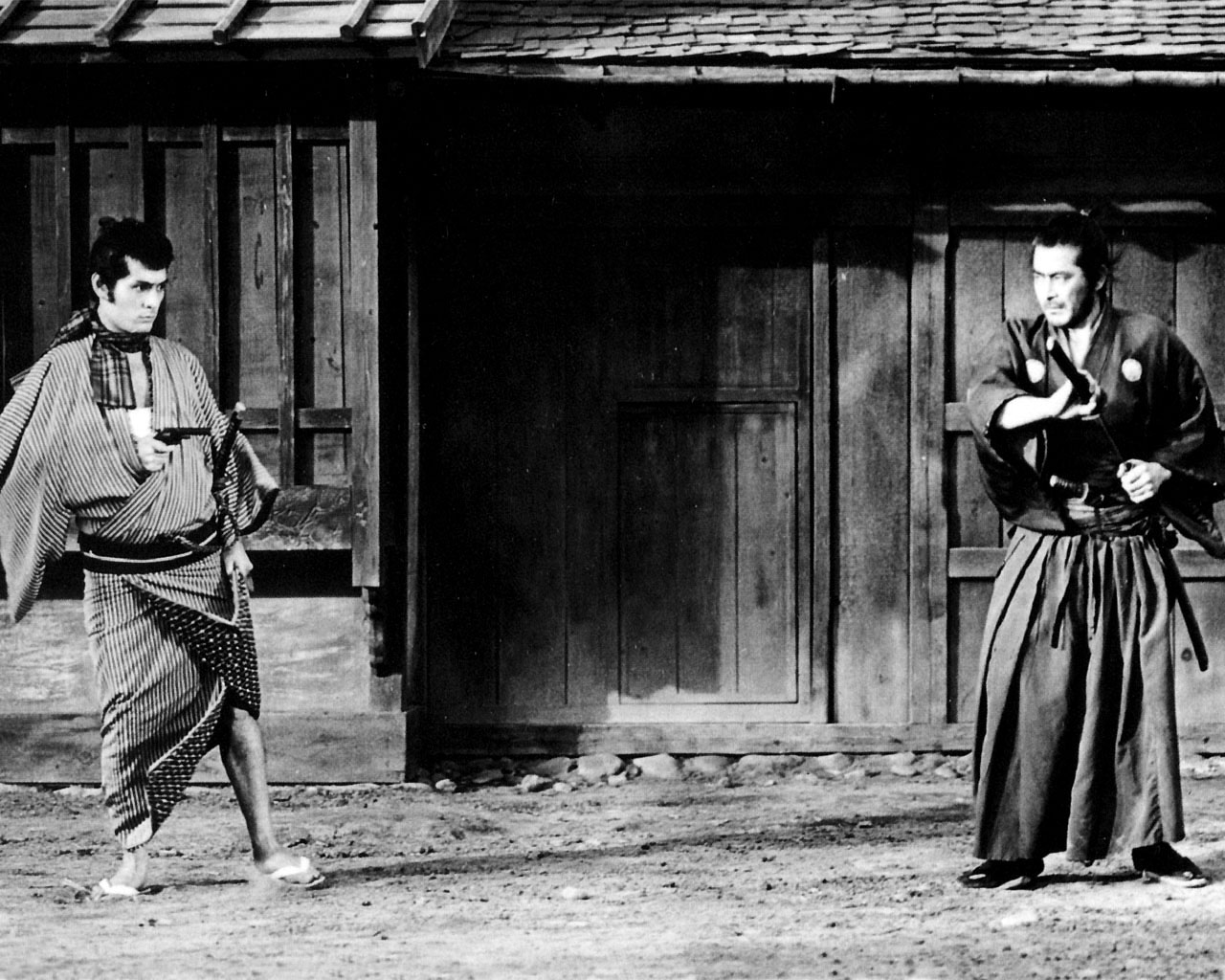
Nakadai and Mifune in “Yojimbo”
Taiga Drama:
“Shin Heike Monogatari”
In our interviews, Nakadai has repeatedly voiced his criticisms of TV productions. But by the same token, he has also personally starred in a number of masterpieces in TV drama, beginning with NHK Taiga drama Shin Heike Monogatari (1972) and followed by the likes of Seizaemon Zanji Tsuroku (1993) and Daichi no Ko (1995).
Movies and TV are the same in that it all starts with me receiving a script. If the script isn’t interesting, I turn it down. Even if it means I won’t have any rice on the table the next day, I turn it down. However, even TV will sometimes have scripts that make me think, “Oh, now this is something I might like to do!”
Shin Heike Monogatari was the first Taiga drama I did. I’d received offers to appear in each one ever since the inception of the Taiga drama concept—I do believe the first offer was for Ako Roshi.
Let me tell you a strange story. I was at a point in my career when I was as busy as one could be just doing theater and movies—I was too busy to even think about TV. But then one day my own mother told me how these neighborhood aunties had said to her, “We haven’t been seeing your son at all as of late. He must have fallen on hard times… What a shame. He’s still so young, too…”
My mother told them, “What are you talking about?! I still go see every theater play and film he does!” The aunties replied, “Well, we don’t go to the theater or the movies. We only know what’s on the telly.” That’s just the kind of era it had become—if you weren’t on TV, you were no actor at all. My mother called me about this incident on the telephone, crying.
I told her, “Mom, who cares what they say? Just forget about those aunties!” She said, “But I can’t! I’m so frustrated! If it’s at all possible, then please, please appear on TV!” A short while later, they approached me about Shin Heike Monogatari. I thought, “All right. I guess it’s time for me to show my filial piety.” That was the reason that led me to doing it.
In Shin Heike Monogatari, Nakadai plays protagonist Taira no Kiyomori. His rival, Emperor Go-Shirakawa, is played by Takizawa Osamu, founder of the Mingei Theatre Company.
At the time, Haiyuza, Bungakuza, and Mingei were called the “Big Three Theater Troupes.” The leaders were Sugimura Haruko for Bungakuza, Senda Koreya for Haiyuza, and Takizawa Osamu and Uno Jukichi for Mingei. Ever since I was enrolled in the Haiyuza Training School, I had been going to see Mingei’s theater shows, being especially taken with Takizawa’s acting. While I never told this to anyone, it was almost to the point where I admired Takizawa more than any of my seniors at Haiyuza. I believe that at the time pretty much every young shingeki actor aimed to become like Takizawa.
When I got to actually perform alongside him, I was nervous to the point that my knees were shaking. He asked me, “So, you’re from Haiyuza?” I replied, “Yes. My name is Nakadai.” So he said, “Oh, I see. Must be tough, a whole year, doing this role.” He had this unique manner of speech that was just so great to listen to.
Dissolvement of Eizo Kyoto &
Importance of the Apprenticeship System
Production company Eizo Kyoto, with whom Nakadai had created numerous film and TV masterpieces, closed its doors in 2010. Their dissolvement was due to budget cuts in movies and television, and the resulting recession in the period drama genre.
When Daiei’s Kyoto Studios went bankrupt, Nishioka Yoshinobu hoped to at least preserve the staff and their skills, and so he started Eizo Kyoto to do just that… But now, even they’ve been dissolved. With the loss of staff like that, I do feel worried about the future of period drama. And it’s not just the staff, but the actors as well.
There are certain rules in period drama. A samurai must walk a certain way. The sword must be drawn a certain way. The wigs must be worn a certain way, depending on the role. Things like that. Less and less people are aware of these rules, and if things go on as-is, my feeling is that the period drama genre itself is going to die out.
In the past the film industry was based on an apprenticeship system, in a good sense of the word. To become a director, for instance, you would first work as an assistant director for close to 10 years. Kihacchan was actually an assistant director for 12 years before he became a director. It’s only then that you’re finally qualified. You learn about everything there is to know in those 10 years. How to make movies, how to make the best use of your actors… You acquire this information by watching and learning from the masters. It’s how you discover your own style of making movies.
I don’t know the current film industry very well, but I do know that most films produced today aren’t so-called “major films.” Toho still has their own film studio out in Kinuta, but even they would rather rent it out than make their own movies at a loss. It would be pointless for me to get angry about any of this, but I will say that compared to how the film industry used to be, the way that they make movies now is completely different.
No matter how talented the director, no matter how talented the actor, none of that matters. These days it’s all about efficiency. Using as little money as possible, as little time as possible, and yet, trying to make something that is actually good… It’s not easy.
Sure, anyone is free to become a director. But when you’re creating something like movies or theater—that is, works of complete art—I do not think you can do so successfully without years of experience and honing your skills. Well, maybe you can if you’re a genius. But geniuses of that magnitude aren’t born every day.
It is very much a group effort, so experience really becomes essential. But now there’s no time to give the people that kind of training—everyone just wants to make everything using the least possible amount of time and money. You see directors and actors who are totally inexperienced, walking around looking self-important while all the staff with any actual skill are gradually disappearing.
The days when actors were actors, when directors were directors, when cameramen were cameramen… I feel like those days are becoming a thing of the past. And that does make me very sad.
The Actors Have All Gone…
Looking back on films of the past, Nakadai says he feels nostalgic, and frustrated with the state of actors today.
No matter if it was Kurosawa or Ichikawa or Naruse, they all employed their actors in a way as if to say, “If the actors don’t do a good job, this film is going to fail.” Sure, movies are made by everyone involved in their production. But everyone firmly believed that if the actors weren’t amazing, then the movie wasn’t going to be amazing either. That’s why they would be very strict with us. It was commonplace for a director to deem an actor as totally no-good and switch them for someone else. It’s not like now when people are given roles just because they happen to be popular.
Similarly when it comes to technique in period drama, no matter if it was Yorozuya or Mifune or Tanba, every actor had their own unique method of doing swordplay. Back in the day, I used to believe that movie actors didn’t have have much skill—I figured it was just the director and his talent that made it all work. But that turned out not to be the case. Movie actors all had the necessary skills, too.
In films like The Human Condition, or in Kurosawa’s films, or in Yamamoto Satsuo’s films, I was acting alongside all these greats of the film industry—my seniors—and I saw how they all knew their lines by heart. Compared to them, I wonder how many actors today are as diligent about their lines? My feeling is that they often just try to “kind of” present the source material as-is. Their acting is all based on “feeling,” or “atmosphere.” But when it’s on TV, even that can be passed off as acceptable—after all, the viewers are often only watching because they have nothing better to do.
Young actors today have gotten careless about basic acting fundamentals. Because of that, actors are no longer capable of properly conveying the work to the viewer. But then those actors have all been exposed to television ever since they were born, so it’s not like they could even think to pay mind to those fundamentals of acting to begin with. This state of affairs is something I’m trying my best to rectify through Mumeijuku, but it is certainly not easy.
The days when “actors were actors and directors were directors” are a thing of the past… So says Nakadai, regretfully. But what changed? What caused this to happen?
These days, I feel like actors as a whole have become scarce. Everyone’s a “talent” now. Although if you were to ask me to explain to you the actual difference between an actor and a talent, I would be hard-pressed to do so…
First of all, back in the day, there was no juggling two or more films. If you were already doing a movie, you couldn’t start doing another. For the supporting actors, sure, but for the leading actors, the director wouldn’t have even allowed it. But now if an actor is working on several scripts at the same time, people somehow take that to reflect the actor’s success. That sort of thing is something that just doesn’t make sense to me. And the people selecting the actors, they refuse to use no-name newcomers because they don’t want their movie to fail. No matter how much talent some particular actor might have, they’ll always go for the more popular actor instead.
And there is never any time whatsoever to be wasted. Especially not on rehearsing. This truly is the era of “efficiency.” But the thing is, when you’re talking about film, theater, literature, painting, anything in the field of fine arts, all that “wasted time” is actually necessary. Our creations—entertainment, art, culture, whatever you want to call it—if there is no surplus, it can’t be made. You can’t make anything on efficiency alone.
Even when I go to places like South Korea, people often ask me, “How come modern Japanese films aren’t interesting?” I always tell them, “There are still capable people in the Japanese film industry even now.” There really are. It’s just that, if you don’t give them a little bit more time and money, they can not make good films.
For me, the appeal of movies is in how, while they are entertainment, they are also philosophical. What does it mean to be human? What is the meaning of life? Is what’s happening in the world good or bad? The kinds of films which make you ponder questions like these—that is what film should be by its nature, but I feel like we’re losing that. This causes me great concern.
While this is something that’s not limited to just film, compared to how it was in the past, creators in today’s Japan are not given nearly enough time and money. In America, multimillionaires will give out donations to creators. In Europe, they have systems in place for the government to give grant money to creators. But in Japan, money never reaches the creators. In that sense I do not consider Japan to be a cultural nation.
I recently appeared in a film called Haru’s Journey which has been receiving lots of positive feedback. The director, Kobayashi Masahiro, waited eight years for me to do the film. He is a wonderful author, with most of his scripts being originals. The next script I got from him was called Japan’s Tragedy, and this one, too, is fantastic. That one might be a very personal film in a sense. But it’s okay for there to be films that are personal—like novels written in the first-person. It’s fine to have films that are manga adaptations, 3D films where the images are jumping out at you, all of that. But surely it is also okay for there to be films that are very much first-person, off-beat, personal…
Except the thing is, most films like that don’t get any distribution. “It’s a great script, but we just can’t distribute it.” “It’s too dark,” they’ll say. What is one to do then? Does it always have to be a lighthearted film with a happy ending? Me, personally, I find films with happy endings to be completely uninteresting. But, well… I suppose this is the sort of time we live in now.
It’s also strange how all the so-called “major companies” have mostly stopped producing films altogether. Toho still owns such a large film studio, and yet they choose merely to rent it out. The only thing they’re thinking about today is how they don’t want to lose any money on production. Producers and directors alike are thinking only about efficiency, so if everyone on set is told to shoot dozens of scenes a day, then they’ve got no choice but to do just that. I feel bad for today’s actors for having to work under such conditions.
I entered the film industry at a time when movie companies would give directors the time and money they needed; a time when films were the greatest form of entertainment. I came up during an era when all these intense movie directors such as Kurosawa Akira, Kobayashi Masaki, and Naruse Mikio could afford to just stop filming for the entire day if they didn’t like how the day’s shoot was going. I consider myself a very, very fortunate man.
Now, in the twilight years of my life, I’m just curious to know how the film industry, the theater industry, and all the young creators and audiences today are going to come together in the future. I would be glad if the next generation brought with them a renaissance. That is my hope.
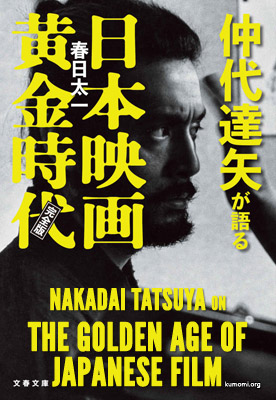
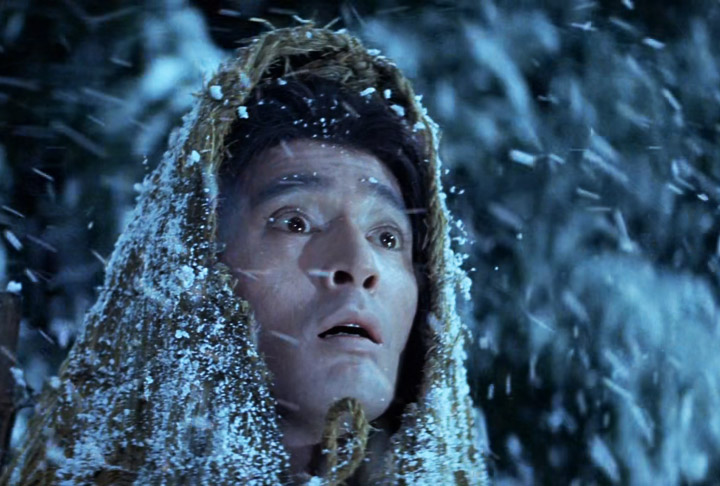
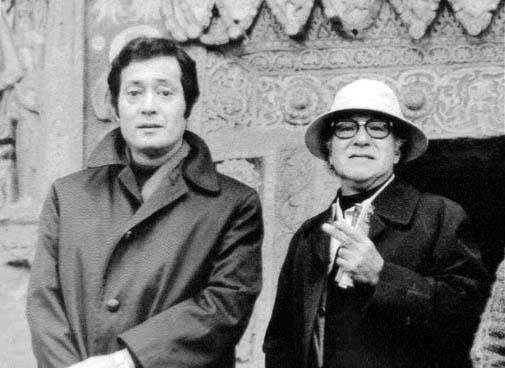
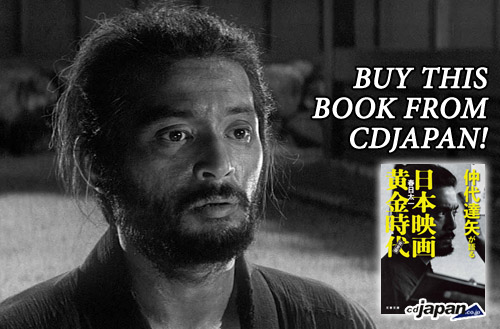

Thank you as always
Yes, many many thanks!
One taiga I’ve seen him in was Hideyoshi where he played Sen no Rikyu. Amazing performance. I didn’t recognize him at first!
I haven’t seen that one! I bet Nakadai would be amazing in the role of Sen no Rikyu.